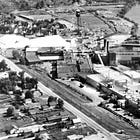West Nipissing Faces Renewed Call to Test for "Forever Chemicals" in Water Supply
Council to Debate if $1,000 PFAS Test Is Warranted
On Tuesday, West Nipissing Council will revisit a critical environmental issue: testing the local water supply for per- and polyfluoroalkyl substances (PFAS), commonly known as "forever chemicals." This discussion marks a resurgence of concerns first raised nearly a year ago, spotlighting potential risks tied to the municipality’s industrial past and its proximity to North Bay’s documented PFAS woes.
West Nipissing last discussed the PFAS question on April 16, 2024, when Councillor Fern Pellerin proposed a $1,000 test to screen the municipality’s drinking water. Pellerin highlighted the region’s vulnerability due to its industrial legacy, notably the massive corrugated paper mill that operated along the Sturgeon River until 2002, less than a kilometer from the current water treatment plant in Sturgeon Falls. Despite this, council declined the request after the Water & Sewer Manager deemed it "not necessary”.
PFAS Risks Specific to West Nipissing
PFAS, used in products like firefighting foam, paper coatings, and stain-resistant fabrics, are notorious for their environmental persistence and health risks, including links to liver damage, immune system disruption, and certain cancers. While North Bay’s PFAS issues stem largely from firefighting foam used at its airport and military base—a contamination hotspot identified by the Department of National Defence since 2017—West Nipissing faces its own unique threats.
The former paper mill, a cornerstone of the local economy for decades, is a prime suspect. Paper manufacturing historically relied on PFAS for grease- and water-resistant coatings, and runoff from the mill site could have seeped into the Sturgeon River, which feeds the municipality’s water treatment plant. This proximity raises alarms, as such industrial legacies often leave lasting chemical footprints.
Unlike North Bay, where Trout Lake tests showed PFAS levels nearly double Health Canada’s proposed 200 nanograms per liter limit for PFOS, West Nipissing has no public data on its water quality regarding PFAS. The Health Unit’s acknowledgment of PFAS in Lake Nipissing, downstream of the Sturgeon River, further fuels speculation that the regional water table might already be compromised.
North Bay’s Cautionary Tale
North Bay’s experience offers a stark warning. After detecting PFAS in its drinking water source, the city committed $20 million to rehabilitation efforts around its airport, yet residents on private wells have been advised to use bottled water since 2017. A North Bay resident on the Echo Essentials Podcast noted that PFAS in well water rendered even farm-fresh eggs unsafe, illustrating the chemicals’ pervasive reach. With over 100 attendees at a recent North Bay community meeting on PFAS, public anxiety is palpable, and West Nipissing cannot afford to assume immunity.
Council’s Next Move
As opposed to when it was brought up in 2024, Pellerin’s topic is now officially on the agenda and should spark an interesting debate among councillors.
Pellerin seeks authorization for a $1,000 test to measure PFAS levels, arguing it’s essential before the municipality invests millions to connect Verner residents to the Sturgeon water source in coming years.
In a memo, Elizabeth Henning, Director of Infrastructure, confirms the test’s feasibility at $1,000 but advises against it, noting it’s not provincially mandated.
The West Nip Voice is a regular newsletter covering issues in West Nipissing and the surrounding area. Please consider becoming a subscriber.





Thank you Councillor Pellerin for actually caring about the citizens of West Nipissing! This test is necessary!
"Elizabeth Henning, Director of Infrastructure, confirms the test’s feasibility at $1,000 but advises against it, noting it’s not provincially mandated."
It is like we are in the middle of a horror movie when the audience screams; "Don't open that door."
If you spend a measlyy $1,000 and the test doesn't find anything, that's good. But if they find that the water is contaminated, then the municipality could be looking at millions in costs.
So, don't open that door!